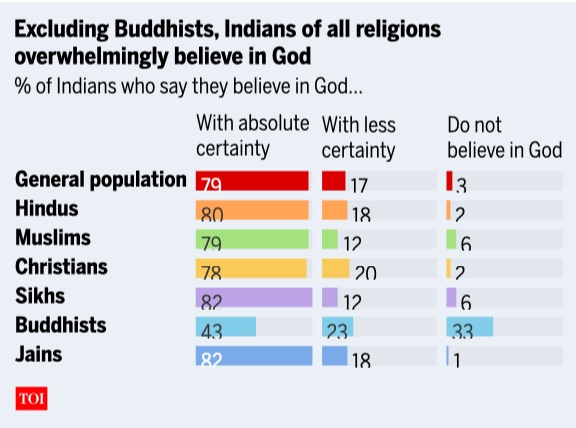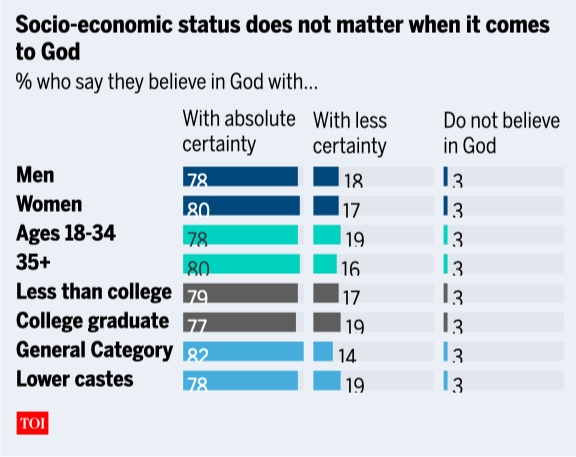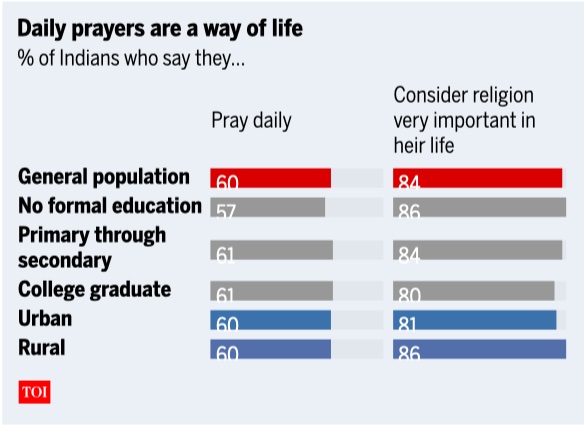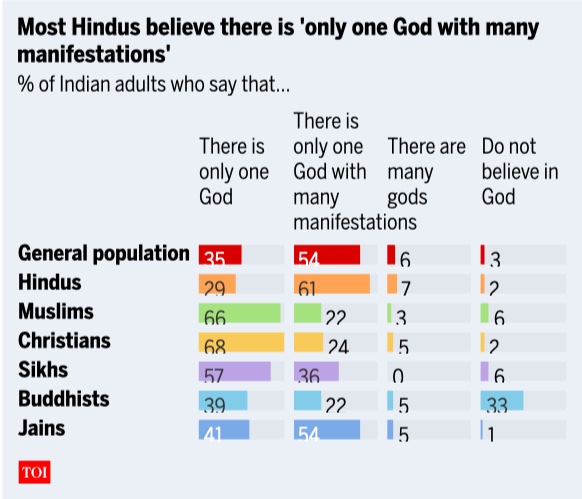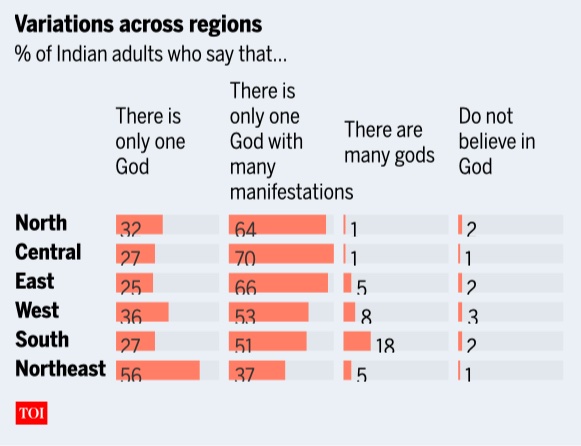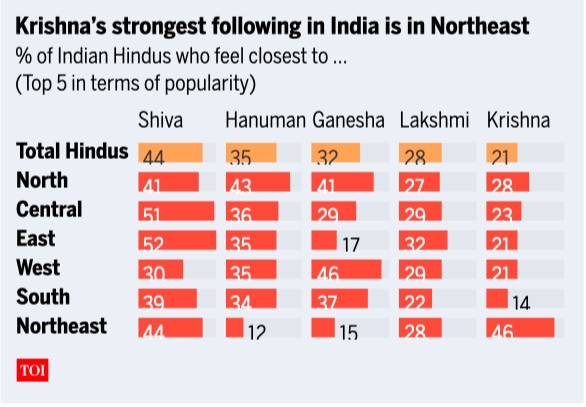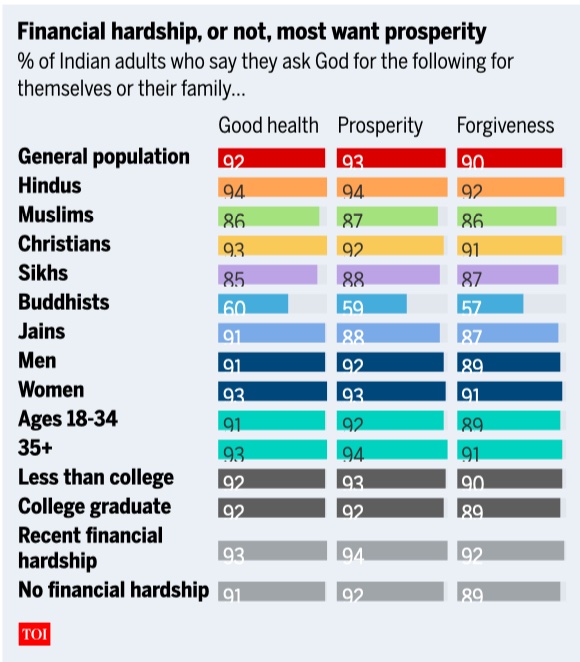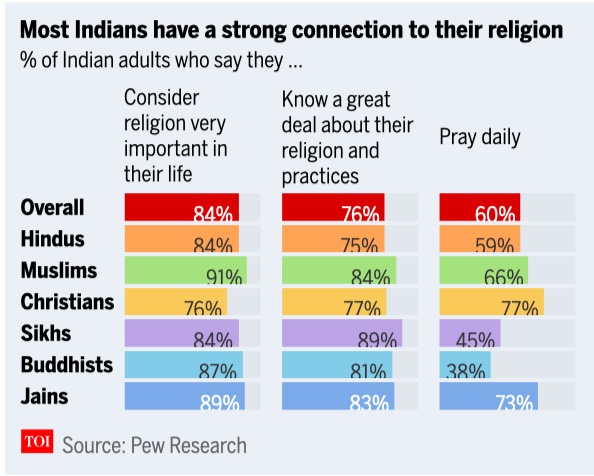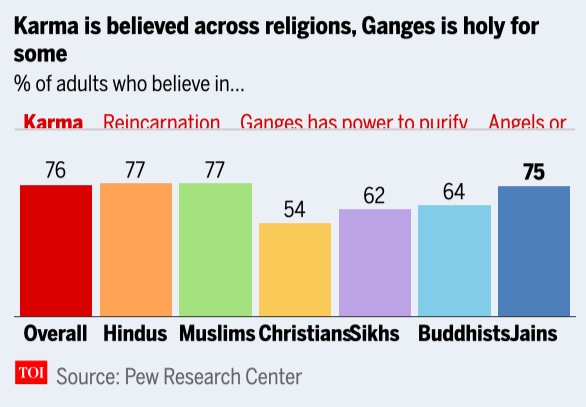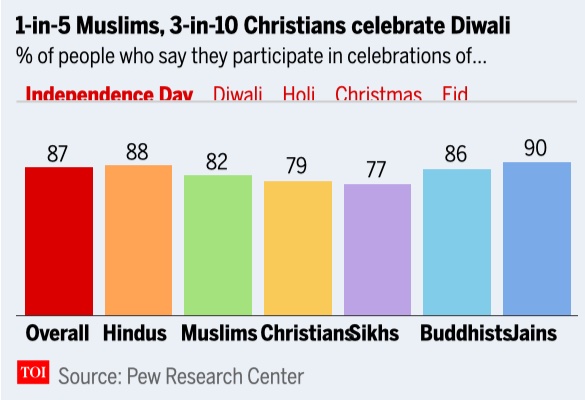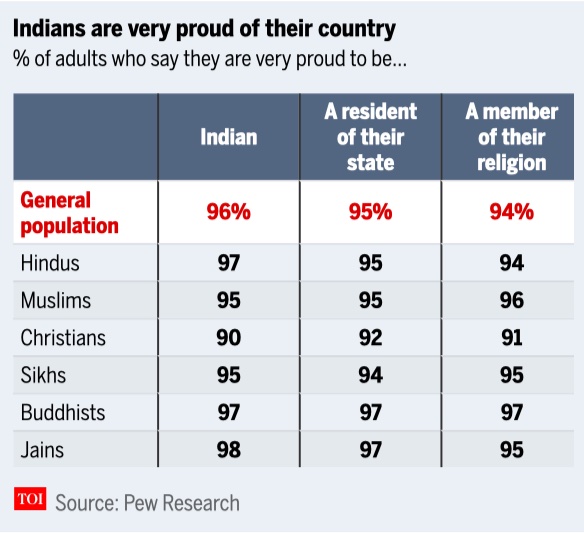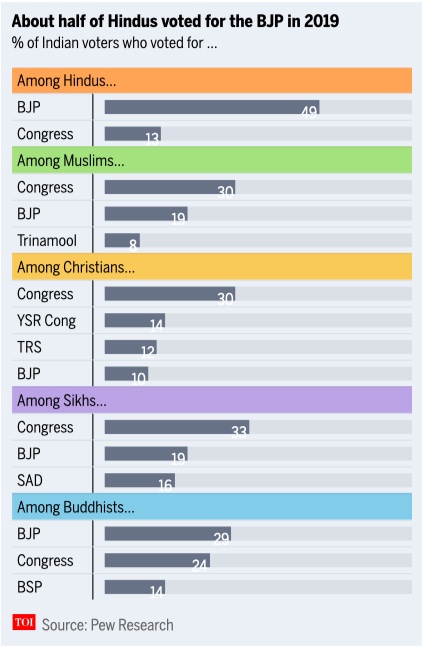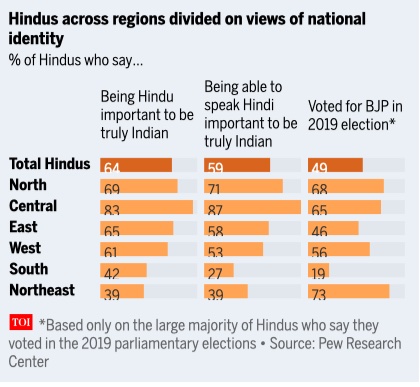Religion, Tolerance, Segregation: India
This is a collection of articles archived for the excellence of their content. |
God, belief in
July 6, 2021: The Times of India
Do you believe in God? Almost 97% of the 29,999 Indians surveyed by American think tank Pew Research Center answered that question with a yes.
About 80% said they are absolutely certain that God exists. While the belief in God seems universal, there are wide variations about the type of deities they worship.
The survey, which was conducted between November 17, 2019, and March 23, 2020, included 22,975 Hindus, 3,336 Muslims, 1,782 Sikhs, 1,011 Christians, 719 Buddhists, 109 Jains and 67 belonging to another religion or as religiously unaffiliated. The findings are summed up in a report: Religion in India: Tolerance and Segregation.
Belief in God is universal… almost
The only exception are Buddhists, one-third of whom say they do not believe in God. Yet, among those who do believe in God, most say they are absolutely certain in this belief.
Age, gender, education don’t matter
The importance of religion and the belief in God are irrespective of people’s socio-economic status. Almost all religions show a similar pattern except for Christians, among whom those with higher education and those who live in urban areas show slightly lower levels of observance, according to the report. Among Christians who have a college degree, 59% say religion is very important in their life, compared with 78% among those who have less education. This also seems to negate the “secularisation theory” which hypothesises that as countries advance economically, people tend to become less religious. The theory was based on the experience of Western European countries after the end of World War II till now.
This is also borne out by the Census, which shows that despite rapid economic growth, there has been virtually no growth in the minuscule share of people who claim no religious identity. There is little difference in personal religious observance between urban and rural residents or between those who are college educated versus those who are not. An overwhelming number among all these groups say that religion is very important in their lives, that they pray regularly and that they believe in God.
How many gods in all?
While the biggest chunk of Muslims, Christians, Sikhs and Buddhists say “there is only one God”, most Hindus and Jains say there is “only one God with many manifestations.” Only a very small share across religions feels that there are many gods.
However, there are variations under this count across regions, says the report. While in most regions at least half of Hindus believe in one God with many manifestations, in the Northeast, most Hindus believe in one God alone. Hindus in the South are more likely to say there are many gods. Southern Muslims and Christians are more likely than their counterparts elsewhere to say there are many gods.
And the most popular Hindu god is …
Those who said they believe in God were asked which one they feel closest to. They were shown 15 images of gods as possible options (though they could name other deities) and were asked to select up to three gods. The survey found that Hindus most commonly feel close to Shiva, though about one-third feel close to Hanuman or Ganesha.
The choice of gods, however, varies by region. Ganesha, for instance, is the most common deity people in Western India feel close to. In the Northeast, 46% of Hindus say they feel closest to Krishna. A good number of Hindus in the South feel close to deities like Murugan (14%), Ayyappa (13%) and Meenakshi (7%), who have hardly any Hindu followers elsewhere in the country, says the report.
What do we want from God?
Unlike the commonly-held belief that it is hardships that drive people to God, the survey found that Indians who recently faced financial hardship are only slightly more likely than other Indians to ask God for prosperity. The people who expressed a belief in God were also asked if they ever ask God for: good health, prosperity and forgiveness. About 90% said they ask God for each.
How religion unites-- and divides India
June 29, 2021: The Times of India

From: June 29, 2021: The Times of India
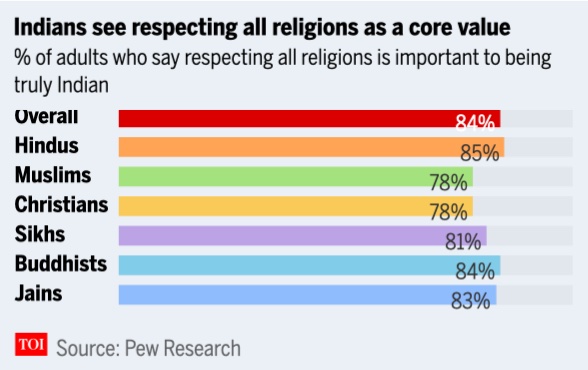
From: June 29, 2021: The Times of India
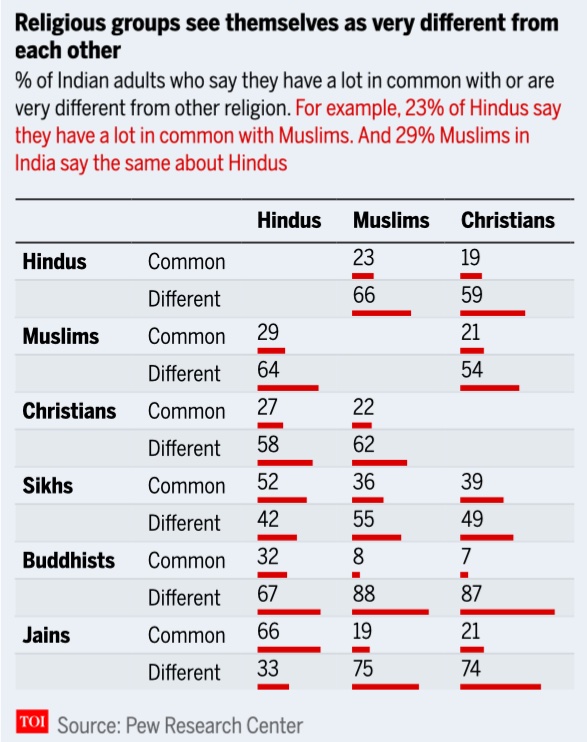
From: June 29, 2021: The Times of India

From: June 29, 2021: The Times of India
How religion unites and divides India
A study by American think tank Pew Research Center throws up interesting insights into how religion matters to so many Indians and also the way it impacts our beliefs and politics.
Pew Research surveyed 29,999 Indian adults (including 22,975 Hindus, 3,336 Muslims, 1,782 Sikhs, 1,011 Christians, 719 Buddhists, 109 Jains and 67 who identify as belonging to another religion or as religiously unaffiliated from November 17, 2019, to March 23, 2020 to come up with a report - Religion in India: Tolerance and Segregation. Here’s what it found.
India’s religious diversity …
India’s home to not only a majority of the world’s Hindus, Jains and Sikhs, but also to one of the world’s largest Muslim populations and to millions of Christians and Buddhists.
… is a way of life
A vast majority of Indians, across all faiths, say that religion is very important in their lives and that they know a great deal about their religion and its practices. Significant portions of each religious group also pray daily.
There's tolerance...
Indians see religious tolerance as a central part of who they are as a nation. Across the major religious groups, most people say it is very important to respect all religions to be “truly Indian”.
. .. but identities matter
Most people feel that they do not have much in common with people of another religion. The majority of Hindus see themselves as very different from Muslims (66%), and most Muslims say they are very different from Hindus (64%). However, two-thirds of Jains and about half of Sikhs say they have a lot in common with Hindus.
We share beliefs …
Despite the desire for religious segregation, Indians share many cultural values and religious beliefs with people traditions from multiple religions intermingling in our lives. For instance, many non-Hindu women say they wear a bindi, even though it has Hindu origins. Similarly, many people embrace beliefs not traditionally associated with their faith.
… and celebrate each other’s festivals
Substantial minorities of Christians (31%) and Muslims (20%) say they celebrate Diwali and some Hindus say they celebrate Muslim and Christian festivals, too: 7% of Indian Hindus say they celebrate the Muslim festival of Eid, and 17% celebrate Christmas.
...but inter-religious marriages are rare
Many Indians, across religious groups, say it is very important to stop people in their community from marrying into other religious groups.
Nation unites us...
Nearly all respondents to the survey said that they are very proud not only to be Indian, but also to be residents of their respective states. This pattern is consistent across different religions, regions and age groups.
...but we differ on politics
This survey asked respondents who they voted for in the 2019 parliamentary elections. The responses vary significantly by religious group.
...even within one religion
The survey finds that Hindus tend to see their religious identity and Indian national identity as closely intertwined. The BJP's appeal with this segment is also greater. Yet, among Hindus, there are large regional divides on views of national identity and politics.
How religion and politics influence each other
June 30, 2021: The Times of India
A large-scale survey conducted by an American think tank brings out interesting aspects about religion, politics and how the two meet. A look at the important findings
American think tank Pew Research Center surveyed 29,999 Indian adults (including 22,975 Hindus, 3,336 Muslims, 1,782 Sikhs, 1,011 Christians, 719 Buddhists, 109 Jains and 67 belonging to another religion or as religiously unaffiliated) from November 17, 2019, to March 23, 2020 to come up with a report – Religion in India: Tolerance and Segregation.
It’s important to note that the interviews were conducted after the 2019 parliamentary elections and the revocation of Jammu and Kashmir’s special status. In December 2019, protests against the new citizenship law had broken out in several parts. Here’s what the report says on religion and politics:
Vote by religion
When the respondents were asked who they voted for in 2019, many said they voted for the winning party, however, the responses vary significantly by religious group. While nearly half of Hindu voters said they voted for the BJP, Congress was the top choice among Muslim (30%), Christian (30%) and Sikh (33%) voters in 2019.
Religion, democracy and strong leaders
The survey asked respondents what would be better suited to solve India’s problems: a “democratic form of government” or a “leader with a strong hand.” Slightly less than half (46%) said that the country should rely on a democratic form of government while the other half (48%) said it would be better to have a leader with a strong hand.
Region changes vote by religion
Among the biggest voting block in terms of religion, Hindus, there is a significant variation in how they voted for the BJP. In the survey, just 19% of Hindus in the south said they voted for the BJP, compared with roughly two-thirds in the northern (68%) and central (65%) parts of the country who say they voted for the ruling party.
Religion mixes with national identity
According to the survey, Hindus tend to see their religious and national identity as closely intertwined. The majority also link national identity with the ability to speak Hindi.
Nationalism is a vote bank
The BJP’s appeal is greater among Hindus who closely associate their religious identity and the Hindi language with being “truly Indian.”
Why politics mixes with religion
A majority of the respondents say that politicians should have at least “some” influence in religious matters (62%) with about a third (29%) saying politicians should have “a large” influence. However, 31% say politicians should generally stay out of religious affairs.
The common factor
Unemployment tops the list of national concerns, across all religions and roughly three-fourths of respondents see corruption (76%), crime (76%) and violence against women (75%) as very big national issues. However, fear of communal violence is a big worry too. (The survey was designed and mostly conducted before the World Health Organization declared the Covid-19 outbreak a pandemic.)
The mind of a BJP voter?
According to the survey, Hindu respondents with a favourable view of the saffron party are:
- more likely than others to oppose inter-religious and inter-caste marriages
- more likely than other Hindu voters to express positive opinions about India’s religious diversity (57% vs 45%)
- more likely than other Hindus to say Hinduism is the one true religion (45% vs 32%)
- no less likely than those who have an unfavourable view of the BJP to say they celebrate Valentine’s Day (21% and 20%, respectively)
- less likely than those who have an unfavourable opinion of the party to say they would accept Dalits as neighbours
- slightly more likely than other Indians to say politicians should have some or a large influence in religious matters (66% vs. 60%).
- more likely than others to be vegetarians (49% vs. 35%)
- slightly more likely than those with an unfavourable view of the ruling party to believe in God with absolute certainty (81% vs. 74%).
